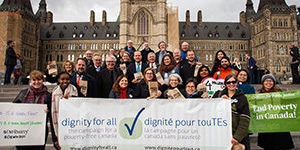Respect for the wisdom and life experiences of elderly persons is quickly eroding.
In Canada, this process is expedited by our country’s immigration policies which create situations where immigrants are financially dependent on children and/or grandchildren. In 2014, for example, reforms to the Parent and Grandparent Program extended the “undertaking period” from 10 to 20 years.
Under the program, sponsors are required to sign a legally-binding undertaking with Citizenship and Immigration Canada stating that they will financially support a family migrant’s basic needs, such as food, clothing, and shelter for a period of 20 years. This legal contract prohibits family migrants from receiving social transfers for the duration of this period. This means that many elderly immigrants are ineligible for Income Assistance, Guaranteed Income Supplement (GIS), and Old-Age Security (OAS) for a period of 20 years after arriving in Canada.
Canada’s dedication to uphold the well-being of the elderly is represented by these income assistance programs. It is, therefore, essential for this system to be equitable and to serve those in the most need. These values are not limited by one’s age or country of origin.
Immigration policies should allow elderly immigrants the financial freedom to access social transfers (provided, of course, that they match the eligibility criteria) without solely relying on their children or grandchildren. This independence can allow for the formation of deeper relationships without the financial stress of this undertaking contract.
By limiting an elderly immigrant’s access to social assistance and creating a system of dependence for the elderly on younger adults, the Canadian government is contributing to the decline of essential inter-generational relationships. Just as the expansion of modern retirement homes limits the exchange of information between generations, the new 20-year undertaking period of dependence simplifies the connection between young and old to a financial bond.
A focus on elderly immigrants is important as they face a greater risk of poverty than elderly natives. On average, Canadian immigrants have significantly lower incomes than Canadian-born individuals. In 2007, the average market income of immigrants was 35% – 55% less than Canadian-born individuals. Assuming this relationship holds for the sub-population of elderly immigrants, this high poverty level highlights the need to offer social assistance to recent elderly immigrants in their financial transition to Canada.
The federal government may look to Sweden and Germany to see the importance of prioritizing the welfare of elderly immigrants.
In Sweden, the immigration system is harmonized for all individuals no matter where they were born. The Swedish social assistance program is renowned for being generous and equitable, as the eligibility rules are consistent for Canadian-born individuals and immigrants. Eliminating the eligibility gap between natives and immigrants is essential to bringing equity to the social transfer system. As a welfare state, Canada’s desire to ensure a minimum standard of living for human beings should not be conditional on nationality or age.
In Germany, the social assistance program is designed to return people to economic independence. The eligibility of the social transfer program is independent of nationality, as it is solely based on one’s residence within Germany. Eliminating biases based upon one’s country of origin and/or one’s age will contribute to a more peaceful and united society.
The urgency of this discussion is evident by the considerable log jam in the Parent and Grandparent Program. As of January 19, 2015, parent and grandparent immigration sponsorship is closed, as the limit of 5,000 applications per calendar year had been reached. Hopefully, this backlog will be relieved soon, in order to allow families the opportunity to reunite and reconnect in Canada.
As a diverse country, we must look beyond our differences in age and nationality to care for the well-being of the vulnerable. Treating elderly natives and elderly immigrants as equals within the income assistance program may sound idealistic. However, it is simply logical for a free and open society like Canada.




